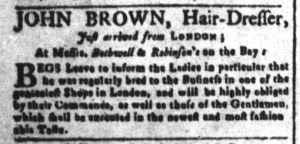What was advertised in a colonial American newspaper 250 years ago today?

“MAKES in the newest Fashion, and in the neatest Manner, all Sorts of Men and Womens Saddles.”
In the summer of 1773, John Sebring, a “Saddler, Chaise and Harness-Maker, from London,” once again took to the pages of the Providence Gazette to promote his services. As he had done in previous advertisements, he used only his last name as a headline for his notice, implying that readers should have been so familiar with his reputation that he did not need to give his full name. In addition, he asserted that he already established a clientele in the city, expressing “his Thanks to all those who have obliged him with their Custom.” Anyone in need of saddles and accessories who was not already familiar with the remarkable Sebring, the advertisement suggested, needed to learn more about the saddler from London and his wares.
To underscore that point, Sebring proclaimed that he “MAKES in the newest Fashion, and in the neatest Manner, all Sorts of Men and Womens Saddles … with every other Article in the Saddlery Way.” In so doing, he deployed common marketing strategies. He made an appeal to fashion, asserting his familiarity with the latest styles, as well as an appeal to quality and his own skill in producing “Saddles, Portmanteaus, Saddle Bags, Holsters, Half Covers, Velvet Jockey Caps, Leather Caps, Bridles,” and other accessories. In a nota bene, he reiterated his knowledge of the current trends: “Ladies Hunting Side Saddles made in the newest Fashion.” In each instance, his London origins bolstered those appeals, suggesting that he had access to the “newest Fashion” in the most cosmopolitan city in the empire and that he received superior training in his trade in that metropolis compared to local competitors. His clients, however, did not have to pay a premium for those benefits. Sebring declared that he set prices “on as low Terms as are sold in any Shop in Providence.”
Appropriately, the saddler ran his workshop “at the White Horse.” He invited current and prospective customers to visit him there to take advantage of the many benefits he outlined in his advertisement, seeking to convince genteel gentlemen and ladies that he was in the best position of any saddlers in Providence to serve their needs.





